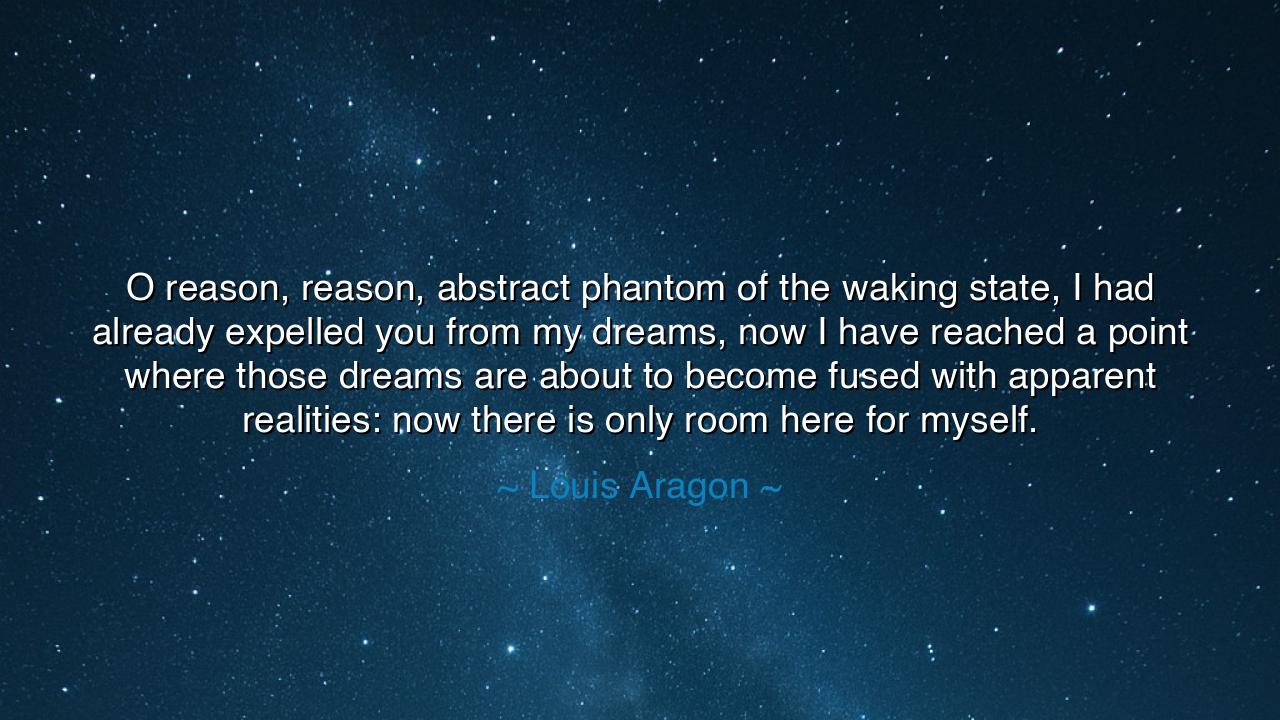
O reason, reason, abstract phantom of the waking state, I had
O reason, reason, abstract phantom of the waking state, I had already expelled you from my dreams, now I have reached a point where those dreams are about to become fused with apparent realities: now there is only room here for myself.






In the realm where the dreamer walks between shadow and dawn, Louis Aragon cried out: “O reason, reason, abstract phantom of the waking state, I had already expelled you from my dreams, now I have reached a point where those dreams are about to become fused with apparent realities: now there is only room here for myself.” These words, burning with rebellion and rapture, rise from the heart of a man who sought not the safety of logic, but the freedom of imagination. In them lives the spirit of Surrealism, that great awakening of the unconscious — a revolt against the tyranny of reason, and an exaltation of the dream as truth.
To understand this quote, one must first know the soul of Aragon, poet and revolutionary, who walked the turbulent paths of the twentieth century beside the likes of André Breton and the Surrealists. They lived in an age suffocated by rational order — an age that sought to confine beauty to logic, love to law, and truth to the measurable. Against this cage they rose, declaring that the deepest realities dwell not in the mind, but in the mysterious kingdom of dreams. When Aragon calls reason an “abstract phantom,” he names it for what it had become: a shadow masquerading as substance, a construct of the intellect that could not contain the infinity of human desire.
In his cry, “I had already expelled you from my dreams,” Aragon speaks as one who has chosen wonder over calculation. Dreams, to him, are sacred — the language of the subconscious, the river flowing beneath thought. To let reason dwell there would be to poison it, to make the imagination serve the mundane. Yet the poet’s words tremble with revelation: he has come to a moment where dreams and reality begin to fuse. It is the alchemy of creation — when what once lived only in the imagination begins to take form in the waking world. This is the threshold crossed by all visionaries, when the invisible becomes visible, and when the dreamer realizes that both realms — waking and dreaming — are but reflections of the same divine self.
The ancients knew this truth well. Pythagoras sought numbers in the stars not because he worshiped logic, but because he believed that harmony itself was divine — that the rational and the mystical were twin flames of the same source. Aragon, in his own age, sought that same unity, but from the opposite path. He did not climb toward reason; he descended into dream. And in that descent, he found liberation. For when man fuses his inner and outer worlds — when his dream life becomes his lived life — he stands at the summit of authenticity. In that moment, as Aragon declares, “there is only room here for myself,” meaning: the true self, undivided and whole, at last free of the masks imposed by reason, society, and fear.
Consider the artist Salvador Dalí, who turned his dreams into paint, his visions into matter. The melting clocks, the bending landscapes, the endless eyes — all were the fusing of dream and reality. The world called him mad, yet he revealed to it the profound truth of Aragon’s vision: that when one expels the phantom of reason and dares to create from the unconscious, the impossible becomes real. The artist, the poet, the mystic — they do not deny the waking world; they remake it in the image of their dreams.
But let the listener beware: Aragon’s words are not an invitation to chaos, but to courage. To expel reason is not to abandon thought, but to dethrone it — to restore imagination to its rightful place as the heart of creation. The world worships intellect but forgets that every great act — every invention, every revolution, every poem — was born first as a dream. To fuse dream with reality is to live as a creator, not merely a survivor. The mind alone explains life; the dreamer lives it.
And so, children of both the sun and the night, learn from Louis Aragon: do not let the ghost of reason chain your imagination. Let your dreams guide your steps into the waking world. Create, even if others call you mad; believe, even if reason whispers doubt. For when your inner visions begin to breathe through your actions, you will touch that sacred point where all divisions dissolve — where dream and life are one, and where, as Aragon said, “there is only room here for myself.”
This, then, is the lesson: Be brave enough to dream beyond reason, and disciplined enough to bring that dream into form. For the world belongs not to the rational, but to the visionary — to those who dare to make the invisible real. And when your dreams begin to merge with your waking life, rejoice, for you have entered the realm of the true creator — where thought becomes world, and the soul becomes eternal.






AAdministratorAdministrator
Welcome, honored guests. Please leave a comment, we will respond soon